
Matthew 5:1 and Matthew 5:2 are the first two verses of the fifth chapter of the Gospel of Matthew in the New Testament. The verses introduce the Sermon on the Mount that will be recited in the next several chapters. The previous chapter concluded with large crowds "from Galilee, and from the Decapolis, Jerusalem, Judea, and beyond the Jordan" who followed Jesus to witness him healing: these verses present Jesus as seeing the crowds and going up onto a mountain to begin teaching.

Matthew 5:3 is the third verse of the fifth chapter of the Gospel of Matthew in the New Testament. It is the opening verse of the Sermon on the Mount, and the section of the sermon known as the Beatitudes.

Matthew 5:45 is the forty-fifth verse of the fifth chapter of the Gospel of Matthew in the New Testament and is part of the Sermon on the Mount. This is the third verse of the final antithesis, that on the commandment: "Love thy neighbour as thyself". Jesus here explains why one must love one's enemies.

Matthew 5:46 is the forty-sixth verse of the fifth chapter of the Gospel of Matthew in the New Testament and is part of the Sermon on the Mount. This is the third verse of the final antithesis, built on the commandment "Love thy neighbour as thyself". Jesus here gives another example of why one must love one's enemies.
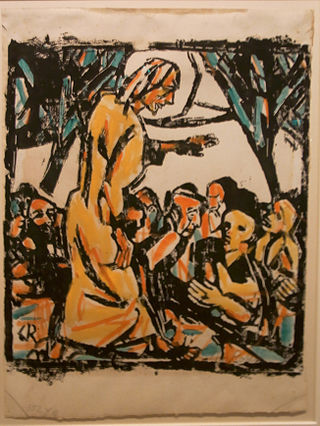
Matthew 5:47 is the forty-seventh verse of the fifth chapter of the Gospel of Matthew in the New Testament and is part of the Sermon on the Mount. This is the third verse of the final antithesis, that on the commandment: "Love thy neighbour as thyself". Jesus here gives another example of why one must love one's enemies.

Matthew 6:2 is the second verse of the sixth chapter of the Gospel of Matthew in the New Testament and is part of the Sermon on the Mount. This verse continues the discussion of how even good deeds can be done for the wrong reasons.

Matthew 7:4 is the fourth verse of the seventh chapter of the Gospel of Matthew in the New Testament and is part of the Sermon on the Mount. This verse continues the discussion of judgmentalism.
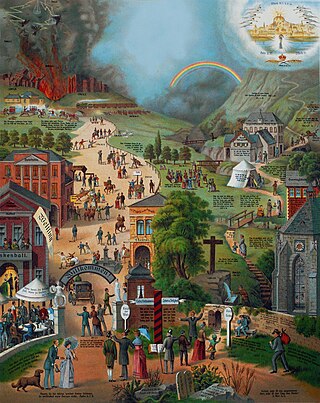
Matthew 7:13 is the thirteenth verse of the seventh chapter of the Gospel of Matthew in the New Testament and is part of the Sermon on the Mount. Luke 13:24 has similar wording in relation to the narrow door or gate.
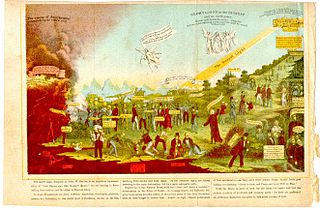
Matthew 7:14 is the fourteenth verse of the seventh chapter of the Gospel of Matthew in the New Testament and is part of the Sermon on the Mount. This verse continues a metaphor begun in the previous one about the ease of following the wrong path.

The Parable of the Wise and the Foolish Builders, is a parable of Jesus from the Sermon on the Mount in the Gospel of Matthew as well as in the Sermon on the Plain in the Gospel of Luke.

Matthew 19 is the nineteenth chapter in the Gospel of Matthew in the New Testament section of the Christian Bible. The book containing this chapter is anonymous, but early Christian tradition uniformly affirmed that Matthew composed this Gospel. Jesus commences his final journey to Jerusalem in this chapter, ministering through Perea. It can be seen as the starting point for the passion narrative.

Matthew 27:64 is the sixty-fourth verse of the twenty-seventh chapter of the Gospel of Matthew in the New Testament. This verse occurs after the crucifixion and entombment of Jesus. In it the chief priests and the Pharisees, who are meeting with Pontius Pilate, ask for a guard for the tomb.
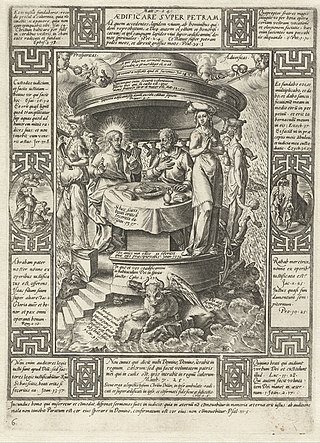
Matthew 7:24 is the twenty-fourth verse of the seventh chapter of the Gospel of Matthew in the New Testament and is part of the Sermon on the Mount. This verse begins the Parable of the Wise and the Foolish Builders.

Matthew 7:25 is the twenty-fifth verse of the seventh chapter of the Gospel of Matthew in the New Testament and is part of the Sermon on the Mount. This verse continues the Parable of the Wise and the Foolish Builders.

Matthew 7:26 is the twenty-sixth verse of the seventh chapter of the Gospel of Matthew in the New Testament and is part of the Sermon on the Mount. This verse continues the Parable of the Wise and the Foolish Builders.
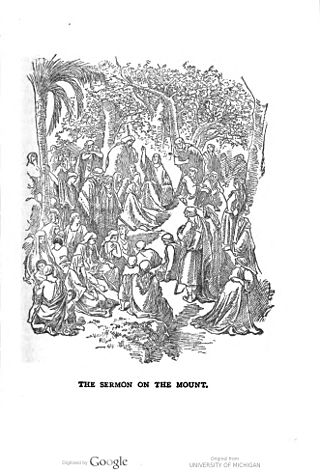
Matthew 7:28 is the twenty-eighth verse of the seventh chapter of the Gospel of Matthew in the New Testament. It forms the first part of a two verse conclusion following the Sermon on the Mount.

Matthew 7:29 is the twenty-ninth verse in the seventh chapter of the Gospel of Matthew in the New Testament. It ends a two verse conclusion following the Sermon on the Mount.
Matthew 12:47 is the 47th verse in the twelfth chapter of the Gospel of Matthew in the New Testament.

Matthew 8:27 is a verse in the eighth chapter of the Gospel of Matthew in the New Testament.

Matthew 8:32 is the 32nd verse in the eighth chapter of the Gospel of Matthew in the New Testament.



















